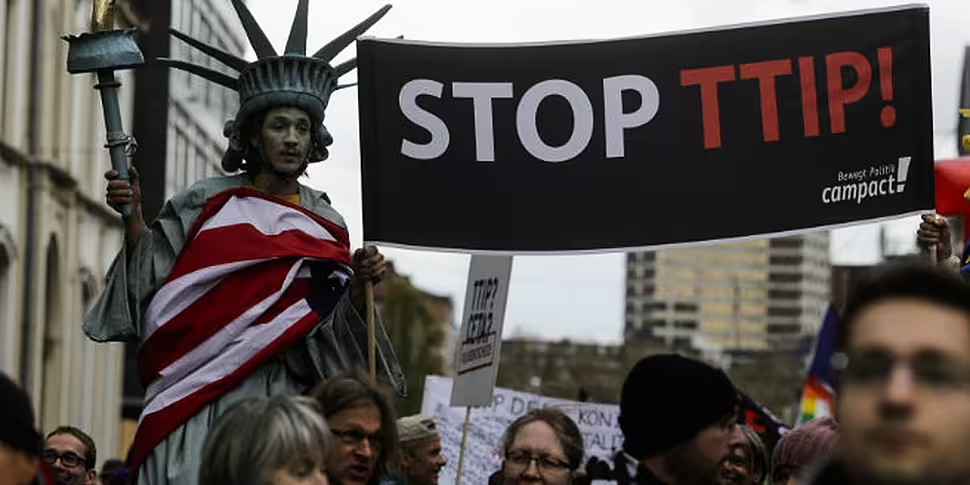Negotiations to open trade between the European Union and the United States have reached a fork in the road as mass protests continue in Germany and US President Barrack Obama's remaining time in office runs short.
Mr Obama had hoped to complete the Transatlantic Trade and Investment Partnership (TTIP) deal during 2016 - before he leaves the White House in January of next year.
He now believes that this is unlikely, "I don’t anticipate that we will be able to complete ratification of a deal by the end of this year, but I do anticipate that we will have completed the agreement," the US president said yesterday.
Failure to secure a deal under his watch could put a transatlantic trade agreement off the table for some time to come.
"If we don’t complete negotiations this year, then upcoming political transitions in the United States and Europe could mean this agreement won’t be finished for quite some time," Mr Obama said.

Markus Schreiber / AP
Hillary Clinton, his former secretary of state is the front-runner to secure the Democratic nomination for the 2016 presidential election is opposed to the deal.
"I have said from the very beginning that we had to have a trade agreement that would create good American jobs, raise wages and advance our national security and I still believe that is the high bar we have to meet. I don't believe it's going to meet the high bar I have set," she said in October of last year, speaking about the controversial deal which brought 35,000 people onto the streets of Hanover yesterday to protest as the US president visited.
Four of the five candidates who could take over from Mr Obama have signalled their opposition to the deal - and failure to secure a deal before he leaves means negotiations will run into election periods in Germany and France.
Opposition
Throughout this process, a protest movement against the liberalisation of trade between the US and the EU has formed.
One of the main concerns is that the deal would give companies legal rights that are more powerful than those of individual states due to TTIP's investor-state dispute settlement' (IDIS) mechanism.
This allows businesses to take legal action against governments that act in ways which compromise the trade agreement and lead to smaller profits for businesses.
Many of those who are against TTIP argue that companies could sue a state if a new rule like an increased minimum wage was introduced because it hurts profits.
Critics often point to the example of an ISDS provision in a free trade agreement between Australia and Hong Kong, allowing the tobacco company Philip Morris to sue the Australian government after it introduced plain packaging laws.

Anthony Devlin / PA
Mr Obama acknowledged the presence of a movement against the deal, and the fear created by the idea of factory closures and job losses "drives, understandably, a lot of suspicion" - he added that a well-designed trade agreement will have benefits for both the EU and the US.
Regulation convergence' between the two zones could reduce the standard of European food by bringing the EU's regulations closer to those in the US.
The deal is likely to lead to cheaper energy that could mean up to 11m extra tonnes of carbon emissions being released into the atmosphere - the principal issue here is that it will be easier for shale oil producers in the US to export into the EU.
Ireland
Enda Kenny was a vocal support of TTIP during his time leading the Fine Gael / Labour Coalition.
"Insofar as assuring the [US] President of Ireland's contribution to this, we have made it perfectly clear that we will work with our European colleagues and American connections to get this across the line," he told an economic conference in the US embassy last year.
In its election manifesto, Fianna Fail indicated its broad support for a deal, the section on TTIP begins, "Fianna Fáil supports the principle of removing barriers to trade. This is essential for Ireland to be successful."
Although, it adds that they, "also believe that trade deals must be fair and must protect the position of states which aim to ensure high living and employment standards."
Research commissioned by the Irish Government in 2015 concerning the economic impact of TTIP found that it would create 10,000 new jobs in Ireland and cause a permanent 1.1% expansion of the country's domestic economy.
The study was compiled by Copenhagen Economics, it found that a number of sectors of the economy would be boosted by an agreement - but Ireland's lucrative beef industry would shrink by between 2 and 3%.









